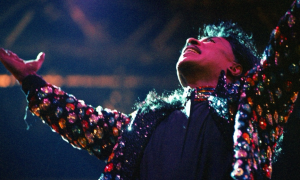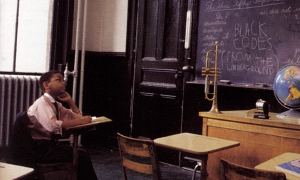Home » Jazz Articles » Opinion » The Perfect Jazz Audience on Record... From Ethiopia
The Perfect Jazz Audience on Record... From Ethiopia
 Not to add to the many rave reviews that have been justly offered on this site, I want to concentrate on just two facets of this completely remarkable recording. Worthy of this narrow a focus is "Shellela," a nearly eight minute "concerto" for the Ethiopian saxophonist Getachew Mekurya and the Either/Orchestra, and the audience response heard during this particular performance.
Not to add to the many rave reviews that have been justly offered on this site, I want to concentrate on just two facets of this completely remarkable recording. Worthy of this narrow a focus is "Shellela," a nearly eight minute "concerto" for the Ethiopian saxophonist Getachew Mekurya and the Either/Orchestra, and the audience response heard during this particular performance. An appalling number of live jazz recordings showcase inattentive audiences, some boorishly so, as the recent box set of Bill Evans at the Village Vanguard showcases through the producer actually re-inserting into the recording non-musical chatter from a meager (in number and intellect) audience. The examples of audience obliviousness to jazz genius are too many to mention, so think of the few positive examples. There's Ellington At Newport 1956 and in Fargo two decades before—maybe midwestern good manners had something to do with Fargo?—and of course The Audience With Betty Carter, and Sonny Rollins G-Man, and maybe that portion of the audience at The Royal Roost who were sober when Charlie Parker played. Note that I exclude "The Jazz at the Philharmonic" recordings because I think hysteria about the event existed beyond the music, and often in spite of the music.
So I think the performance of "Shellila" is actually the greatest recorded example of an ecstatic and informed audience response to supreme jazz in the history of recorded jazz. The composition is a warrior's cry, and the saxophonist carries forward what Ayler proposed but rarely fully realized. This is a jazz march where the tenor saxophonist is the supreme commander of the band and of the audience simultaneously. There are five climactic moments in saxophonist Mekurya's solo that the audience responds to. Their palable response is delight, amazement, enthrallment, excitement — what the early New Orleans musicians may have known in audience responses to their jazz marches, and what the avant-gardists trying to update that ecstacy, like Henry Threadgill, have always tried to attain. And as the audience eggs Mekurya forward, and deeper, into the logic of his solo, so does the ever-attentive Either/Orchestra.
What made this audience in Addis respond the way it did? I can only speculate at the multiple factors, but I would like to think that the force of improvisation as a warrior's battle cry was part of the reason. Ethiopians have had so often had to literally fight for their lives, that to make a musical masterpiece distilled from the emotions connected to battle seems likely. Whatever the reason, give five stars to the audience and musicians both. This recording is the flower of their profound embrace.
< Previous
New for Now
Comments
About Either/Orchestra
Instrument: Band / ensemble / orchestra
Related Articles | Concerts | Albums | Photos | Similar ToTags
For the Love of Jazz
 All About Jazz has been a pillar of jazz since 1995, championing it as an art form and, more importantly, supporting the musicians who create it. Our enduring commitment has made "AAJ" one of the most culturally important websites of its kind, read by hundreds of thousands of fans, musicians and industry figures every month.
All About Jazz has been a pillar of jazz since 1995, championing it as an art form and, more importantly, supporting the musicians who create it. Our enduring commitment has made "AAJ" one of the most culturally important websites of its kind, read by hundreds of thousands of fans, musicians and industry figures every month.





















